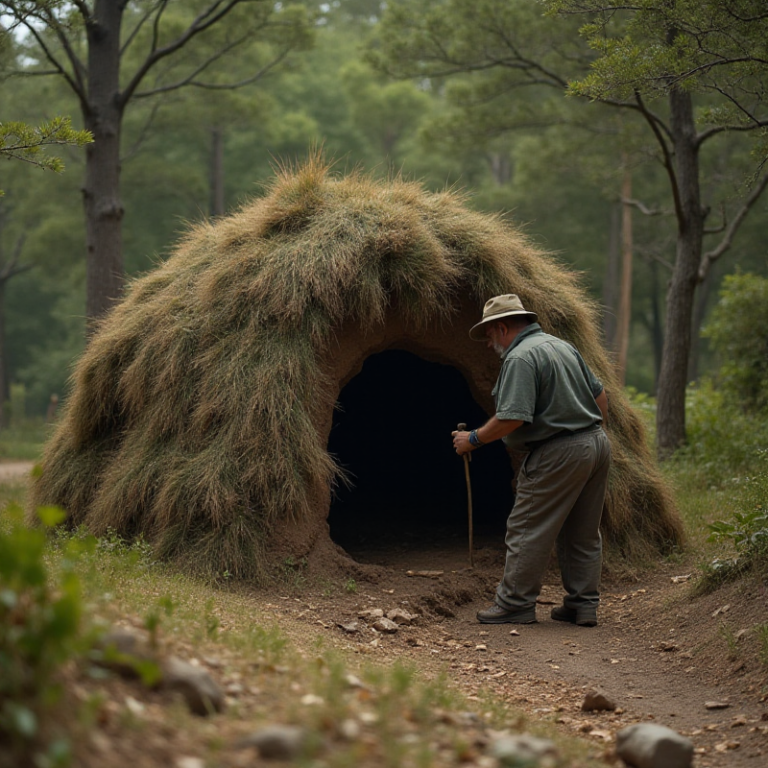Why Essential Survival Skills Matter
Essential survival skills are the cornerstone of preparedness. Whether faced with natural disasters, unexpected emergencies, or societal disruptions, knowing how to respond can make the difference between comfort and chaos. This guide covers the top skills every prepper should master to stay self-sufficient and secure in uncertain times.
1. Building and Maintaining Shelter
Shelter is vital for protecting against harsh weather conditions and maintaining body temperature. Here’s what you need to know:
- Basic Shelter Types: Learn to build simple structures like lean-tos, debris huts, and A-frame shelters .
- Insulation and Ventilation: Understand how to insulate your shelter with materials like leaves or moss and incorporate proper ventilation to avoid moisture buildup.
- Maintenance Tips: Regularly inspect your shelter for damage and reinforce it as needed, especially if it’s being used long-term.
Mastering shelter construction means securing a safe space for rest and recovery when living off-grid or in the wild.
2. Finding and Purifying Water
Water is essential for survival, yet access to clean water isn’t guaranteed during a crisis. Here’s how to stay hydrated:
- Identifying Sources: Locate potential sources such as rivers, streams, and rainwater catchment systems.
- Purification Techniques: Master various purification methods, such as boiling, using water purification tablets, and creating a basic filtration system with sand, charcoal, and gravel.
- DIY Water Filters: Building a homemade water filter can be done using common items like a plastic bottle and natural filtration layers.
With these skills, you’ll ensure a consistent supply of safe drinking water in emergency situations.
3. Starting and Maintaining a Fire
Fire provides warmth, safety, and a means to cook food. Understanding fire-starting is essential for any survivalist:
- Fire-Starting Methods: Familiarize yourself with multiple techniques, including the use of flint and steel, a bow drill, and even simple lighters and matches.
- Types of Fire Structures: Know the difference between a teepee fire, a log cabin fire, and a Dakota fire hole for various uses such as cooking or conserving fuel.
- Fire Safety: Always clear a safe area and monitor fires to prevent them from spreading, particularly in dry or windy conditions.
Mastering fire-making not only boosts comfort but is crucial for cooking and sanitation.
4. Foraging for Edible Plants and Food Sources
Learning which plants are safe to eat and which are not can be life-saving. Here’s how to get started:
- Common Edible Plants: Familiarize yourself with easily recognizable plants like dandelions, cattails, and wild berries.
- Foraging Safely: Always apply the universal edibility test and carry a reliable field guide for plant identification.
- Trapping and Hunting Basics: Know how to set simple snares or create traps for small game using natural materials.
With foraging and basic hunting knowledge, you can supplement food supplies when conventional resources run dry.
5. Basic First Aid and Medical Knowledge
In an emergency, professional medical help may not be available. Being equipped with basic first aid skills is indispensable:
- First Aid Kit Essentials: Ensure your kit includes bandages, antiseptics, tweezers, a multi-tool, pain relievers, and medical tape.
- Wound Treatment: Learn how to properly clean and dress wounds to prevent infection.
- CPR and Emergency Response: Familiarize yourself with the steps for CPR and other life-saving techniques, such as the Heimlich maneuver.
Having these medical skills at your disposal can be the difference between life and death during a crisis.
6. Navigation Without GPS
When technology fails, traditional navigation methods are invaluable:
- Using a Compass: Practice basic compass reading and orientation skills.
- Natural Navigation: Learn how to use the position of the sun, stars, and landmarks to maintain direction.
- Topographical Maps: Understand how to read and interpret topographic maps for terrain and water sources.
Being adept at navigating without GPS ensures you can find your way to safety if stranded or lost.
7. Self-Defense and Security
Protecting yourself and your supplies is an essential aspect of survival:
- Basic Self-Defense Techniques: Know defensive tactics and practice situational awareness to avoid potential threats.
- Setting Up Perimeters: Secure your shelter or camp by establishing perimeters using makeshift alarms or motion detectors.
- Weapon Handling: If you choose to own weapons, get trained in safe handling and maintenance practices.
Security knowledge not only helps in personal defense but also in deterring would-be intruders.
Practice Makes Perfect
Mastering these essential survival skills takes time and practice. Start incorporating them into your routine, even if it’s as simple as a weekend camping trip. The more familiar you are with these techniques, the better equipped you’ll be when real-life challenges arise. Remember, the goal is not just to survive but to thrive with confidence and resilience.



